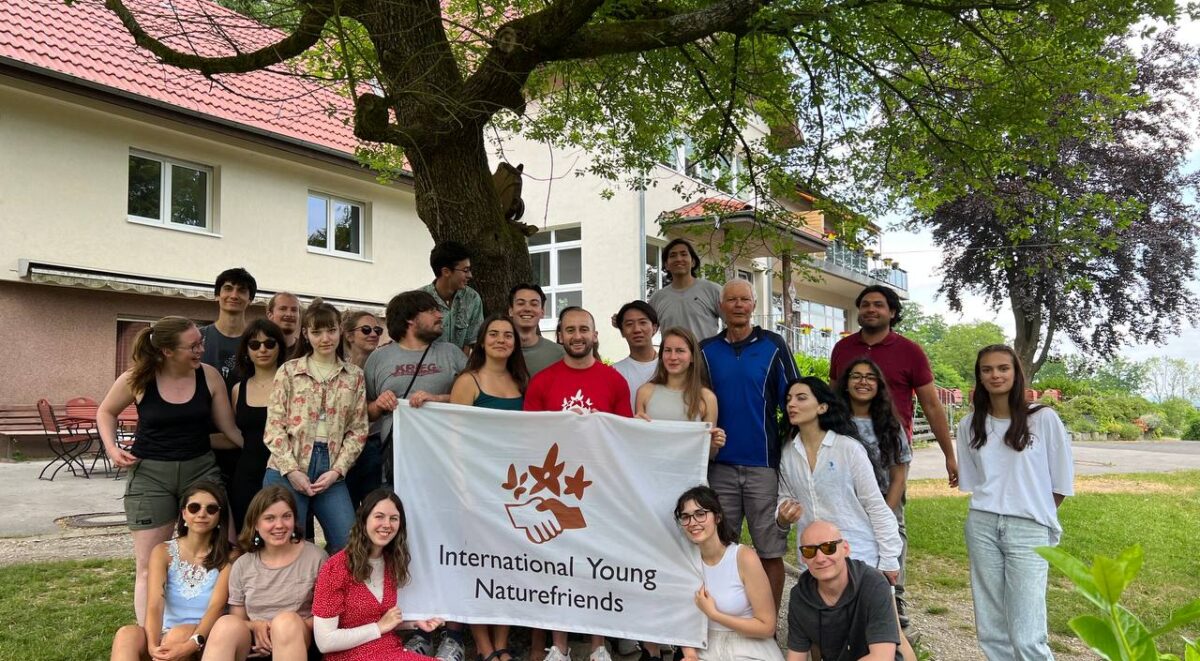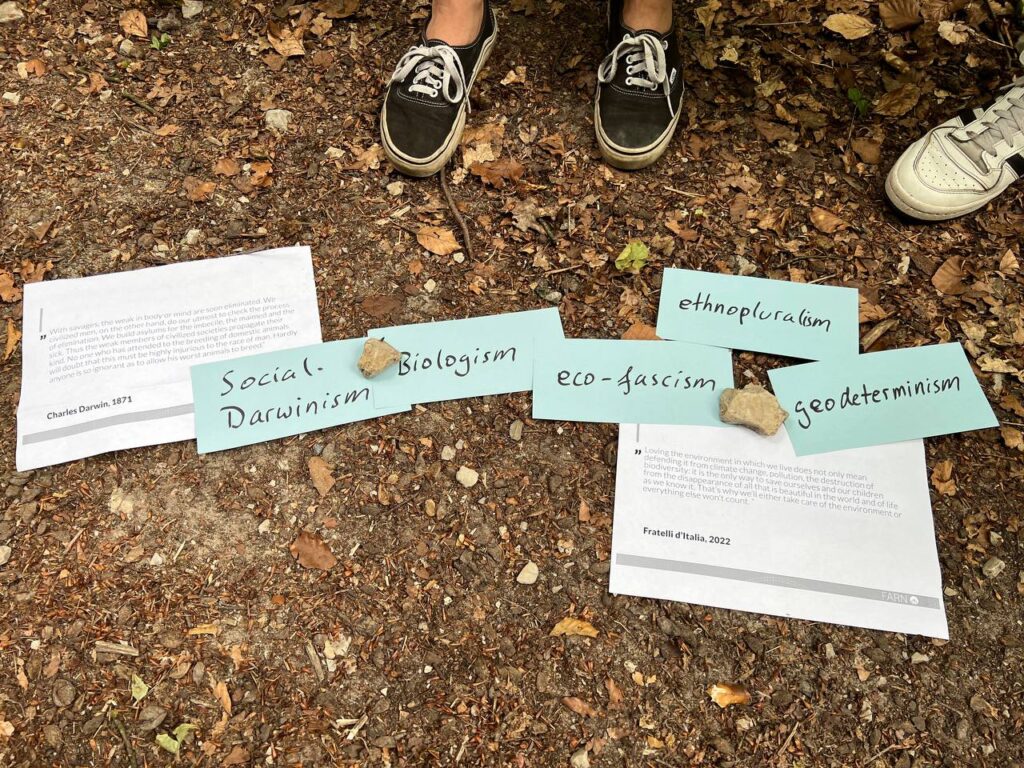
Hello Naturefriends,
Here’s another article from your favorite intern at IYNF. This time, we’ll talk about the training for trainers “Let’s Fight for a Socio-Ecological Diversity” in Bielefeld.
This non-formal and theoretical education week mainly focused on the environment and antagonist ideologies that affect the protection and care for the same. This week in Bielefeld was enriching and reflective in many of the activities, done by different experts in different areas. In this article I’ll mention some of the activities that personally caused a major impact and concern.
After arriving at Bielefeld Bhf we needed to take the local train to Ubbedissen station, which is 15 minutes from the city. Once we arrived, we did a refreshing and very much needed walk (after some hours in the train) to reach the Naturfreundehaus Teutoburg. After the arrival, we could immediately feel the Naturfriends around. It was a charming welcome from familiar faces from different places. As we waited for all the participants, we started with some get-to-know activities to get to know those new Naturefriends. Once all the participants arrived, the trainers introduced themselves and showed us the upcoming activities and schedules, which exceeded our expectations.
The very first activity was of particular interest, due they made us deal with our own decisions and criteria. It consisted of a trainer quoting an specific statement, such as;
- ‘Overpopulation is one of the main cause of Climate Change’
After this, we needed to decide to stand upon 3 possible options. Stand on the left if you agree. On the right is disagreement and finally in the middle if neutral.
Most of us agreed upon this statement. The other majority on the right. Just one person remained neutral. The statement was made by a eco-fascism leader, famous for his nonsense and unproven statements attributing climate Change to other factors and sectors of society, such as migrants. Therefore, it is needed to have a whole context of the statements we read and see in the media, not only let us drag for the first impression or assertive a statement can sound. Most of us were ashamed or impressed by the stand we took, nevertheless this was part of the activity, to learn and disseminate the information properly.
As the sky turned gray, we engaged in an activity, involving the identification of quotes and their historical time. The objective was to raise awareness about the overlaps and categorize if it was right-wing extremism, far right or environmental activist. As well, try to guess the year that the quote was stated and the person who did it. Some of them sound like they were spoken 500 years ago, while others emerged during the course of this year. It was surprising that many ideas prevail nowadays and remain unchanged, prompting us to ponder whether human kind have truly taken necessary steps to rectify the behaviors that led us to today’s climate issues. Here’s one of the examples that shocked me the most;
“With savages, the weak in body or mind are soon eliminated. We civilized men, on the other hand, do our utmost to check the process of elimination. We build asylums for the imbecile, the maimed and the sick. Thus the weak members of civilized societies propagate their kind. No one who has attended to the breeding of domestic animals will doubt that this must be highly injurious to the race of man. Hardly anyone is so ignorant as to allow his worst animals to breed.”
This is an example that has been adapted to different kinds of people and cultures. Not in the same words, but denotation and exclusion. This is a Charles Darwin quote. Do we agree with the father of evolution?
The next activity was the mapping climate agendas of right-wing populist parties in Europe, this was one of the most challenging tasks we had. In this section, we needed to divide into groups, and then select a country where this right-wing is emerging or consolidated already. In our case, we needed to speak about the Netherlands, and how Geert Wilders, an anti-islam, eco-fascist and green patriotism Dutch politician deals with the environment issues within his political party.

The other teams dealt with the Spain, France, Germany and Norway cases. The central idea of the activity was to spot similar discourses, behaviors, conducts, laws, problems and postures against the environment, and the link it has with their leaders and identify which current they belong to (ecofascism, Green politics, Green Patriotism, far-right, populism)
In many cases it’s obvious how leaders tend to approach the Climate change issue, delegating the problem to areas that had nothing to do or are completely irrelevant. The main roots of climate change do not lay on migration, minorities or religion, but on the unmeasured pollution and land use the governments around the globe allow. During the workshops, we also learned more about the skepticism about science, and how rethorics play a huge role in the discourse of politicians, minimizing, mocking and denying even some scientific truths. As well, Multilateral international agreements, such as the Paris Agreement and other EU regulations and directives. The Laura and Dodo talk was also highly intriguing. Mainly based on Climate (In) Justice, with exploring many approaches such as colonialism, race perspective, Carbon Mapping, climate science, Global south and North. The conversation also touched racial matters, including racism, BiPoC representation and gender equality. This dialogue encompassed many issues and successfully related to the environment concerns.
After the talk, there was an activity notably practical. We were divided into pairs, and tasked with matching quotes with its respective author. The quotes were scattered throughout the room alongside information about the backgrounds of the activists. So based on the context, vocabulary, and events mentioned in the quotes, we could attempt to deduce the authorship. In the end, only a few of us got it right, but the exercise allowed us to become familiar with numerous activists that have fought for our environment. We gained insight of their stories, achievements and problems through this noble enterprise.
The week at Bielefeld was full of knowledge and experts on different areas, willing to share their expertise and experiences with the Naturefriends. We truly appreciate every single activity and teaching. From all the members of IYNF, we want to thank the Naturfreundehaus Teutoburg, to the reception, cleaning staff, chefs, trainers, the peacocks and everyone who made the week an incredible and enriching experience.

